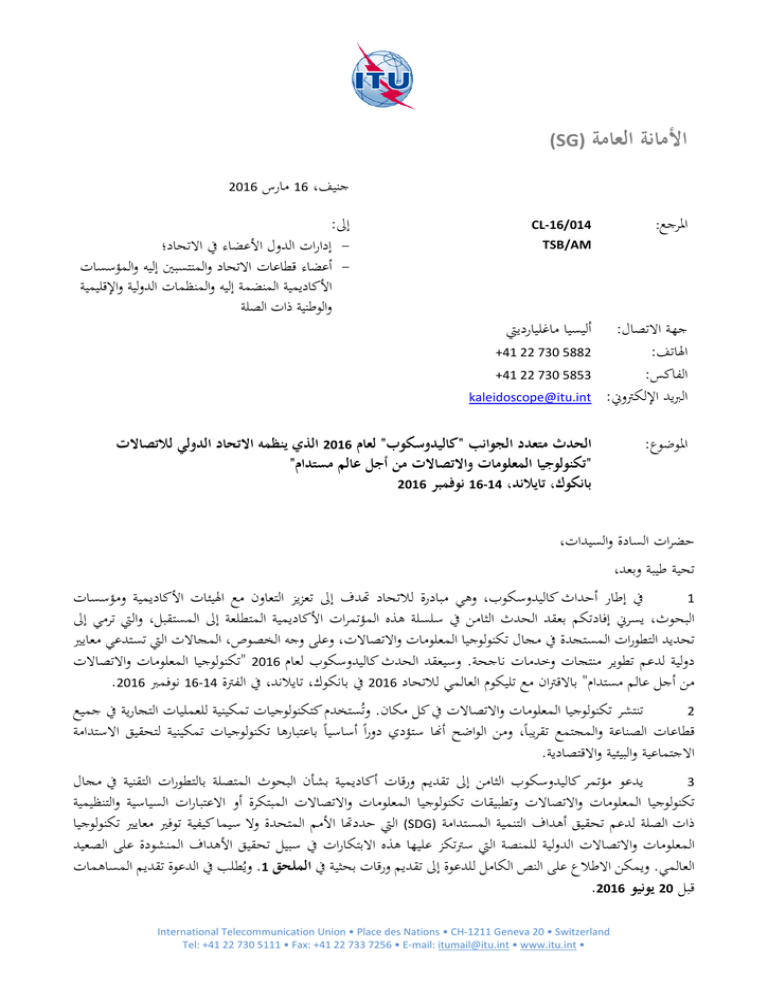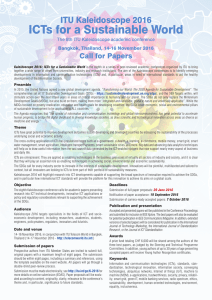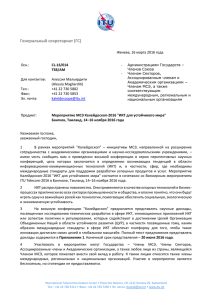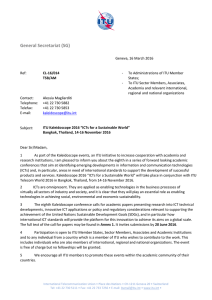ةناملأا ماعلا ة
advertisement

األمانة العامة )(SG جنيف 16 ،مارس املرجع: CL-16/014 TSB/AM جهة االتصال: اهلاتف: الفاكس: الربيد اإللكرتوين: املوضوع: أليسيا ماغلياردييت 2016 إىل: إدارات الدول األعضاء يف االتحاد؛ أعضاء قطاعات االتحاد والمنتسبني إليه والمؤسساتاألكاديمية المنضمة إليه والمنظمات الدولية واإلقليمية والوطنية ذات الصلة +41 22 730 5882 +41 22 730 5853 kaleidoscope@itu.int الحدث متعدد الجوانب "كاليدوسكوب" لعام 2016الذي ينظمه االتحاد الدولي لالتصاالت "تكنولوجيا المعلومات واالتصاالت من أجل عالم مستدام" بانكوك ،تايالند 16-14 ،نوفمبر 2016 حضرات السادة والسيدات، تحية طيبة وبعد، يف إطار أحداث كاليدوسكوب ،وهي مبادرة لالتحاد هتدف إىل تعزيز التعاون مع اهليئات األكاديمية ومؤسسات 1 البحوث ،يسرين إفادتكم بعقد الحدث الثامن يف سلسلة هذه المؤتمرات األكاديمية المتطلعة إىل المستقبل ،واليت ترمي إىل تحديد التطورات المستجدة يف مجال تكنولوجيا المعلومات واالتصاالت ،وعلى وجه الخصوص ،المجاالت اليت تستدعي معايري دولية لدعم تطوير منتجات وخدمات ناجحة .وسيعقد الحدث كاليدوسكوب لعام " 2016تكنولوجيا المعلومات واالتصاالت من أجل عالم مستدام" باالقرتان مع تليكوم العالمي لالتحاد 2016يف بانكوك ،تايالند ،يف الفرتة 16-14نوفمرب .2016 تنتشر تكنولوجيا المعلومات واالتصاالت يف كل مكان .وتُستخدم كتكنولوجيات تمكينية للعمليات التجارية يف جميع 2 قطاعات الصناعة والمجتمع تقريباً ،ومن الواضح أهنا ستؤدي دوراً أساسياً باعتبارها تكنولوجيات تمكينية لتحقيق االستدامة االجتماعية والبيئية واالقتصادية. يدعو مؤتمر كاليدوسكوب الثامن إىل تقديم ورقات أكاديمية بشأن البحوث المتصلة بالتطورات التقنية يف مجال 3 تكنولوجيا المعلومات واالتصاالت وتطبيقات تكنولوجيا المعلومات واالتصاالت المبتكرة أو االعتبارات السياسية والتنظيمية ذات الصلة لدعم تحقيق أهداف التنمية المستدامة ) (SDGاليت حددهتا األمم المتحدة وال سيما كيفية توفري معايري تكنولوجيا المعلومات واالتصاالت الدولية للمنصة اليت سرتتكز عليها هذه االبتكارات يف سبيل تحقيق األهداف المنشودة على الصعيد العالمي .ويمكن االطالع على النص الكامل للدعوة إىل تقديم ورقات بحثية يف الملحق .1ويُطلب يف الدعوة تقديم المساهمات قبل 20يونيو .2016 International Telecommunication Union • Place des Nations • CH-1211 Geneva 20 • Switzerland • Tel: +41 22 730 5111 • Fax: +41 22 733 7256 • E-mail: itumail@itu.int • www.itu.int -2- وباب المشاركة مفتوح أمام الدول األعضاء يف االتحاد وأعضاء القطاع والمنتسبني والمؤسسات األكاديمية وأمام أي 4 شخص من بلد عضو يف االتحاد يرغب يف المساهمة يف العمل .ويشمل ذلك أيضاً األفراد األعضاء يف منظمات دولية وإقليمية ووطنية .والمشاركة يف الحدث مجانية ،ولكن لن تقدم أي منح لحضوره. 5 ونحث جميع أعضاء االتحاد على الرتويج هلذه األحداث يف األوساط األكاديمية يف بلداهنم. الحدثhttp://itu.int/go/K-2016 : وستتاح معلومات تفصيلية حول التسجيل واللوجستيات يف الصفحة الخاصة هبذا 6 يف وقت قريب من موعد المؤتمر .ويرجى اإلحاطة علماً أن التسجيل المسبق للمشاركين في ورش العمل سيجري على الخط حصرياً. ونود أن نذكركم بأن على مواطين بعض البلدان الحصول على تأشرية للدخول إىل تايالند وقضاء بعض الوقت فيها. 7 ويف هذه الحالة ،يجب طلب التأشرية والحصول عليها من المكتب (السفارة أو القنصلية) الذي يمثل تايالند يف بلدكم ،أو من أقرب مكتب من بلد المغادرة يف حالة عدم وجود مثل هذا المكتب يف بلدكم .ويرجى من المشاركني الذين يحتاجون إىل دعم البلد المضيف للحصول على تأشرية الدخول االطالع على صفحة "كاليدوسكوب" يف العنوان التايل.http://itu.int/go/K-2016 : وسينشر المزيد من المعلومات يف أقرب وقت ممكن. وتفضلوا بقبول فائق التقدير واالحرتام. [التوقيع] هولني جاو األمني العام الملحقات: 1 -3- ANNEX 1 (to CL-16/014) ICTs for a Sustainable World The 8th ITU Kaleidoscope academic conference Bangkok, Thailand, 14-16 November 2016 Call for Papers Kaleidoscope 2016: ICTs for a Sustainable World is the eighth in a series of peer-reviewed academic conferences organized by ITU to bring together a wide range of views from universities, industry and research institutions. The aim of the Kaleidoscope conferences is to identify emerging developments in information and communication technologies (ICTs) and, in particular, areas in need of international standards to aid the healthy development of the Information Society. Preamble In 2015, the United Nations agreed a new global development agenda, “Transforming our World: The 2030 Agenda for Sustainable Development”. The comprehensive set of 17 Sustainable Development Goals (SDGs https://sustainabledevelopment.un.org/sdgs), and the 169 Targets within, will stimulate action over the next fifteen years in areas of critical importance to humanity and our planet. The SDGs do not only replace the Millennium Development Goals (MDGs), but also build on them, making them more “integrated and indivisible, global in nature and universally applicable”. While the MDGs focused on poverty eradication, education and health goals for developing countries, the SDGs cover economic, social and environmental pillars of sustainable development to be applicable to ALL countries. The Agenda recognizes that “the spread of information and communication technology and global interconnectedness has great potential to accelerate human progress, to bridge the digital divide and to develop knowledge societies, as does scientific and technological innovation across areas as diverse as medicine and energy.” Theme ICTs have great potential to improve development outcomes in both developing and developed countries by increasing the sustainability of the processes underlying social and economic activity. The cross-cutting application of ICTs has popularized terms such as e-governance, e-health, e-learning, ecommerce, mobile money, smart grid, smart water management, smart agriculture, intelligent transport systems, smart sustainable cities, and more. Big data and advancing data analytics techniques will help us to draw useful information from the vast seas of data generated by the ICT-enabled systems that now support nearly every aspect of business and daily life. ICTs are omnipresent. They are applied as enabling technologies in the business processes of virtually all sectors of industry and society, and it is clear that they will play an essential role as enabling technologies in achieving social, environmental and economic sustainability. The SDGs call for every industry sector to innovate in the interests of sustainable development. Innovations will be plentiful, multifaceted and tailored to context, but all innovators are looking to ICTs to form part of their portfolio of sustainability measures. Kaleidoscope 2016 will highlight research into ICT developments capable of supporting the broad spectrum of innovation required to achieve the SDGs, and in particular how international ICT standards will provide the platform for this innovation to achieve its aims on a global scale. Objective The eighth Kaleidoscope conference calls for academic papers presenting research into ICT technical developments, innovative ICT applications or policy and regulatory considerations relevant to supporting the achievement of the SDGs. -4- Audience Kaleidoscope 2016 targets specialists in the fields of ICT and socio-economic development, including researchers, academics, students, engineers, policymakers, regulators, innovators and futurists. Date and venue 14-16 November 2016, in conjunction with ITU Telecom World in Bangkok, Thailand (14-17 November 2016 - http://telecomworld.itu.int/). Submission of papers Prospective authors from ITU Member States are invited to submit full, original papers with a maximum length of eight pages. The submission should be within eight pages, including a summary and references, using the template available on the event website. All papers will go through a double-blind peer-review process. Submission must be made electronically; see http://itu.int/go/K-2016 for more details on online submission (EDAS). Paper proposals will be evaluated according to content, originality, clarity, relevance to the conference’s theme and, in particular, significance to future standards. Deadlines Submission of full paper proposals: 20 June 2016 Notification of paper acceptance: 19 September 2016 Submission of camera-ready accepted papers: 7 October 2016 Publication and presentation Accepted and presented papers will be published in the Conference Proceedings. In addition, extended versions of selected papers will be considered for publication in the International Journal of Technology Marketing, the International Journal of Standardization Research, or the Journal of ICT Standardization. Awards A prize fund totaling CHF 6,000 will be shared among the authors of the three best papers, as judged by the Steering and Technical Programme Committees. In addition, young authors of up to 30 years of age presenting accepted papers will receive Young Author Recognition certificates. Keywords Information and Communication Technologies (ICTs), standards, standardization, technological innovation, information society, converging technologies, ubiquitous networks, internet of things (IoT), machine to machine (M2M), e-applications, trustworthiness, security, privacy, reliability, smart grid, green IT, mobile banking services, radio spectrum, ethics, sustainability, development, human-oriented technologies, environment, equality, inclusiveness. Suggested (non-exclusive) list of topics Track 1: Technology, network infrastructure and architecture evolution SDG 9: Industry, innovation and infrastructure SDG 12: Responsible consumption and production Use of 5G system and sensory networks to manage natural and human-built systems Environmental actuators and sensors Security-, privacy-, and trust-enhancing technologies Software-defined everything in a multi-vendor market Architecture for machine-oriented communications such as M2M, IoT, sensor networks Quality of service, quality of experience, performance Protocol architecture convergence and interoperability Disaster relief systems, network resilience and recovery Optical and wireless communication convergence systems Architecture considerations for seamless mobility Green-power networks and intelligent grids Long-distance and ultra-high-speed transmission network systems (terabit, exabit) Mobility and nomadicity -5- Track 2: ICT applications and services for sustainable development SDG 3: Good health and wellbeing SDG 6: Clean water and sanitation SDG 7: Affordable and clean energy SDG 11: Sustainable cities and communities SDG 14: Life below water Track 3: Social, economic, environmental and policy aspects of ICT for sustainable development SDG 4: Quality education SDG 5: Gender equality SDG 8: Decent work and economic growth SDG 13: Climate action SDG 17: Partnership for the goals Nanonetworks ICT in waste reuse and disposal Vehicle and infrastructure convergence Energy consumption and the cloud Infrastructures for e-mobility E-services Internet of Things (IoT) ICT and road management systems Automated vehicles and vehicle communications Multimedia coding Digital financial services (e.g., mobile money and mobile payments) Big data analytics and quality assessment of sustainable development Effect of cloud computing services on the environment Green applications of robots and drones Innovative applications and content delivery (IPTV, games, etc.) Ageing and ambient assistive living Over-the-top (OTT) services ICT support of smart homes and cities The smart grid Economic models and the role of ICT in sustainable development Intellectual property rights Conformance and interoperability aspects Inclusiveness, affordability and equal access Strategies for integrating sustainable development into standardization and international public policy Network neutrality Regulation Accessibility and usability Digital rights and identity management Engineering education about sustainable development and standardization. ICT to support environmental standards Standards and regulations for ICT energy consumption Steering Committee Christoph Dosch (ITU-R Study Group 6 Vice-Chairman; IRT GmbH, Germany) Kai Jakobs (RWTH Aachen University, Germany) Takuro Sato (Waseda University, Japan) Mostafa Hashem Sherif (AT&T, USA) Technical Programme Committee Chairman: Kai Jakobs (RWTH Aachen University, Germany) The Technical Programme Committee is composed of over 100 subject-matter experts. Details will be available shortly at http://itu.int/en/ITU-T/academia/kaleidoscope/2016/Pages/progcom.aspx. Additional information For additional information, please visit the conference website: http://itu.int/go/K-2016. Inquiries should be addressed to Alessia Magliarditi, ITU, Switzerland, at kaleidoscope@itu.int. _____________




